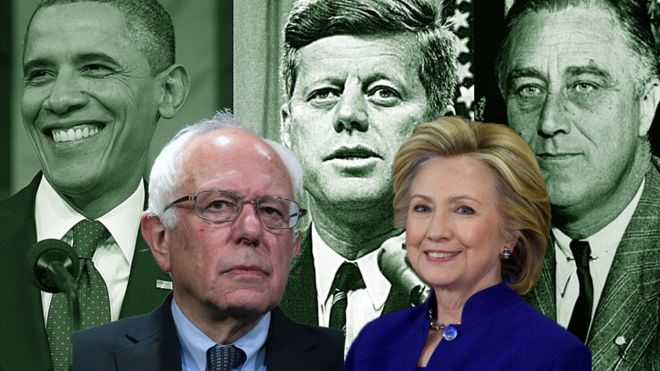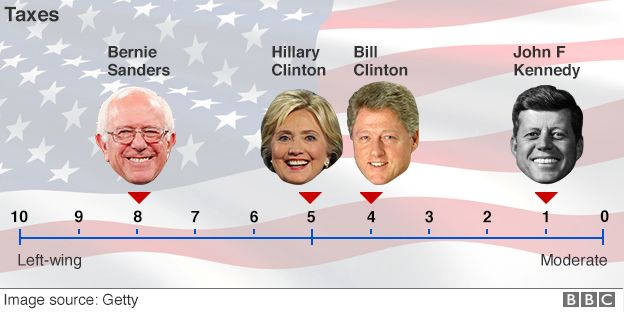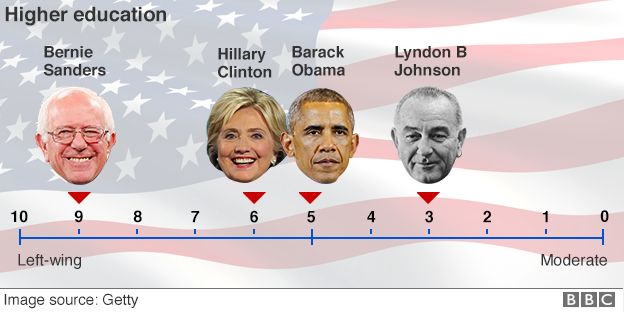US election 2016: Bernie Sanders' and Hillary Clinton's policies compared

Anthony ZurcherNorth America reporter
28 February 2016
From the sectionUS Election 2016

Democratic road to the White House
On the road with Hillary Clinton
Why Hillary and Bernie both won and lost in Nevada
Sanders taps into anti-Obama sentiment
Video Bernie fans want 'bold ideas' not realism
Hillary Clinton and Bernie Sanders are in a pitched battle for the Democratic nomination, fighting for the hearts and minds of left-leaning voters across the US.
But where do they stand on the issues? While the candidates often agree on substance if not style, here's a look at five areas where they differ - not just from each other, but from their presidential predecessors, as well.
Taxes
They will go up - but for whom?

Bernie Sanders promises he will reduce income inequality through changes to US through tax policy. He has called for a 10% tax surcharge on billionaires, raising the top three tax brackets and creating a new top rate, boosting capital gains and estate taxes, extending Social Security taxes, going after income made abroad by US corporations, and creating a new 0.2% tax on all earners to fund a paid family leave programme.
Hillary Clinton's tax plan is basically Sanders-lite. She wants a 4% surtax on income over $5 million, an increase in capital gains taxes, the closing of "tax loopholes" for the wealthy, taxing hedge fund managers' "carried interest" income at higher rates and increasing the estate tax rate.
Bill Clinton also raised taxes on the wealthy - and caught considerable criticism from conservatives for doing so. He instituted two new high-level tax brackets, raised corporate taxes, and increased income subject to Medicare and Social Security levies. After Republicans took control of Congress two years into his administration, he signed legislation lowering the capital gains taxes. He also increased a tax credit for poorer workers.
John F Kennedy was the original Democratic tax-cutter. He reduced the top rate in the US from 95% to 65% and the corporate tax rate from 52% to 47%. Today's conservatives love to quote his claim that a high tax rate "siphons out of the private economy too large a share of personal and business purchasing power".
Higher education
Pitching college education that's free or just affordable

Bernie Sanders has set the bar when it comes to higher education policy in the modern Democratic Party, with his call for free college for all Americans funded by taxing Wall Street financial transactions. He points to the runaway costs of higher education as one of the driving forces behind growing income inequality in the US.
Hillary Clinton supports a plan to make two-year community college free, but her higher education policies are more modest. She has called for lowering student loan interest rates, providing $17.5 billion to improve the quality of higher education and encouraging colleges to set affordable tuition rates that don't require student loans.
Barack Obama signed legislation streamlining the student loan system, including provisions that allow the government to directly loan money to students rather than rely on for-profit middle-men. He has also proposed making the first two years of college free, with a programme modelled on a Tennessee system devised by the state's Republican governor.
Lyndon Baines Johnson is the godfather of the modern Democratic Party's education policies. As president he spearheaded passage of the Higher Education Act of 1965, which increased federal funding for universities and provided low-interest student loans and grants for needy students. It was landmark legislation in its day - but now seems relatively modest.
Sem comentários:
Enviar um comentário